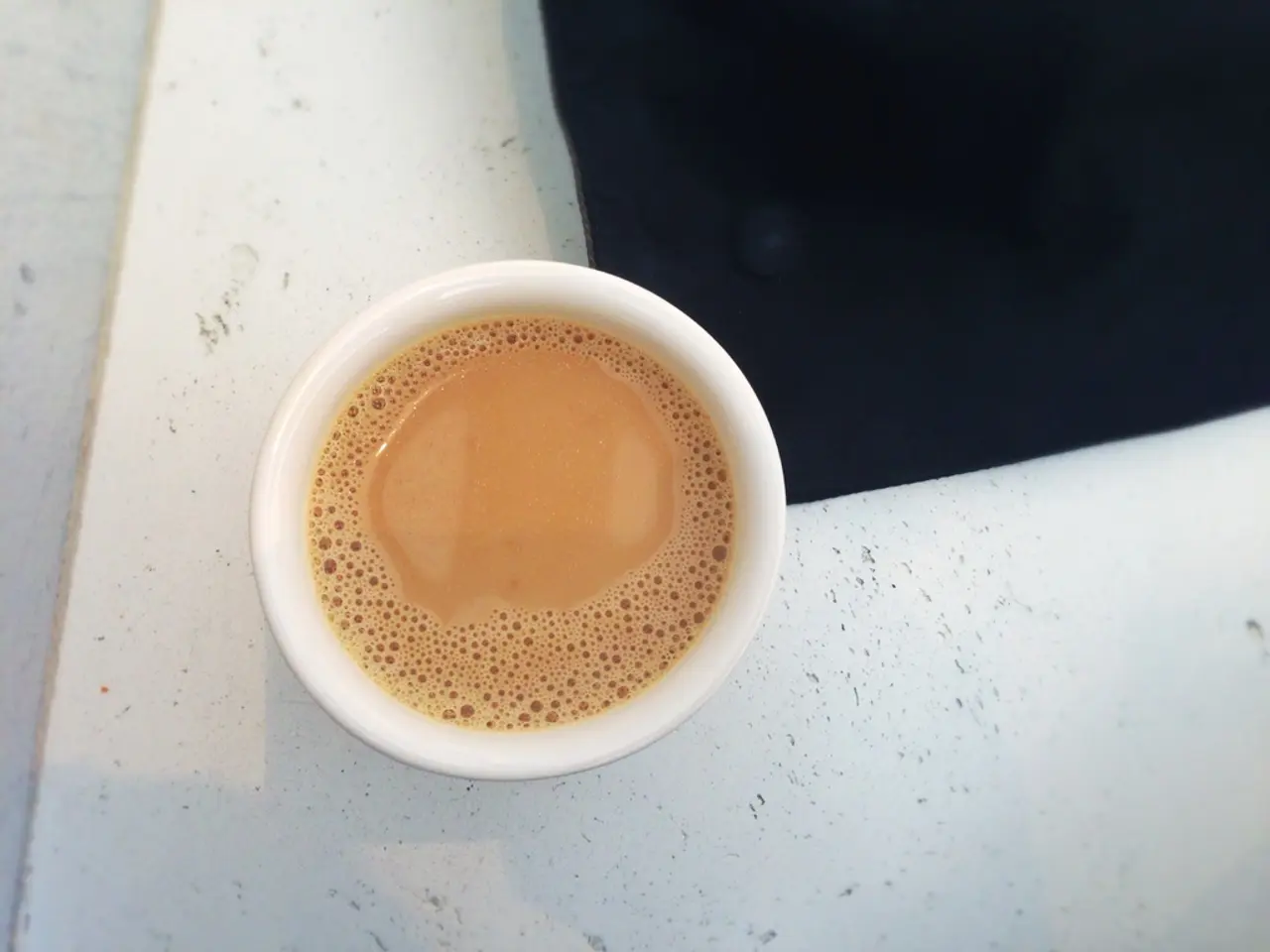Popular Beverages Offer Unique Health Benefits and Potential Side Effects
Alterative drinks for a healthy energy surge: five caffeine options to consider
In today's world, coffee isn't the only beverage that can provide an energy boost and promote overall health. Alternatives like black tea, green tea, matcha, guarana, and hot water with lemon each offer distinct advantages and potential drawbacks.
Black Tea
Black tea, known for its robust flavour, contains antioxidants (flavonoids) that may help reduce cancer risk, support heart health, and maintain blood pressure. It can improve mood, concentration, and exercise performance due to moderate caffeine levels, which are approximately half that of coffee [1][5]. However, excessive consumption can lead to anxiety, insomnia, and irritability, and it may also reduce iron absorption, potentially leading to anemia, especially if consumed with meals. Trace toxic elements like lead and aluminum may accumulate if tea is brewed too long [1][3].
Green Tea
Green tea is a popular choice for those seeking a caffeine boost without the jitters. It supports weight management, balanced blood sugar, and provides antioxidants that reduce oxidative stress. Green tea typically contains less caffeine than black tea but enough for an energy boost [2][3]. However, excessive intake can similarly lead to caffeine-related issues, including heart palpitations and anxiety, as well as reduced iron absorption due to tannins [3].
Matcha
Matcha, a powdered form of green tea, offers concentrated antioxidants and nutrients since the entire leaf is consumed. It has roughly twice the caffeine of brewed green tea but less than coffee, combined with L-theanine which promotes calm, sustained alertness without jitters. It enhances mental clarity and physical health [2][4]. However, high caffeine content compared to regular green tea means it may cause caffeine-related side effects if consumed in large amounts.
Guarana
Guarana, derived from a Brazilian plant, is a natural source of high caffeine content, often used in energy drinks. It contains antioxidants and anti-inflammatory compounds that may support brain function, anti-aging, and cholesterol management [2]. However, due to its potency, small amounts are sufficient, and overconsumption can lead to typical caffeine side effects like jitters, heart palpitations, and insomnia.
Hot Water with Lemon
Hot water with lemon is a caffeine-free option that hydrates, aids digestion, and supplies vitamin C and minerals supporting cardiovascular health. It is a gentle, detoxifying ritual without stimulant effects. However, lemon's acidity may affect dental enamel if consumed excessively over time.
The table below summarises the main benefits, primary side effects, and caffeine levels of each beverage:
| Alternative | Main Benefits | Primary Side Effects | Caffeine Level | |---------------------|-----------------------------------------|-------------------------------------|-------------------------| | Black Tea | Antioxidants, heart health, lowers risk of cancer, mood/energy boost | Anxiety, insomnia, reduced iron absorption, toxic elements | Moderate (half coffee) | | Green Tea | Weight management, blood sugar control, antioxidants | Anxiety, heart palpitations, reduced iron absorption | Low to moderate | | Matcha | Concentrated antioxidants, calm alertness (L-theanine), mental clarity | Caffeine-related issues if overconsumed | Moderate (twice green tea) | | Guarana | High caffeine, antioxidants, anti-inflammatory | Jitters, insomnia, heart palpitations | High | | Hot Water with Lemon | Hydration, digestion aid, vitamin C support | Minimal; possible dental enamel impact if excessive | None |
In conclusion, these alternatives provide various health-promoting antioxidants and other compounds with generally lower caffeine content than coffee. Their risks mostly arise from their caffeine or tannin content and how much is consumed. Moderate intake with awareness of individual sensitivity is advisable for all [1][2][3].
[1] Mayo Clinic. (2021). Black tea: Uses, side effects, interactions, dosage, and warnings. [online] Available at: https://www.mayoclinic.org/drugs-supplements-nutrition/black-tea/nutrition/srns-20071122
[2] Healthline. (2021). Matcha: Benefits, uses, side effects, and precautions. [online] Available at: https://www.healthline.com/nutrition/matcha
[3] Healthline. (2021). Green tea: Uses, side effects, interactions, dosage, and warnings. [online] Available at: https://www.healthline.com/nutrition/green-tea
[4] Healthline. (2021). Guarana: Uses, side effects, interactions, dosage, and warnings. [online] Available at: https://www.healthline.com/nutrition/guarana
[5] WebMD. (2021). Black Tea. [online] Available at: https://www.webmd.com/vitamins/ai/ingredientmono-1014/black-tea
- Beyond coffee, beverages like black tea, green tea, matcha, guarana, and hot water with lemon each offer unique advantages in the areas of science, health-and-wellness, and fitness-and-exercise, specifically providing numerous antioxidants and nutrients that enhance health and support various body functions.
- In the realm of nutrition, these alternatives offer diverse benefits such as weight management, blood sugar control, antioxidants for reducing oxidative stress, and improvements in mental clarity and physical health, while minimizing potential side effects through moderate consumption and attention to individual sensitivity.




